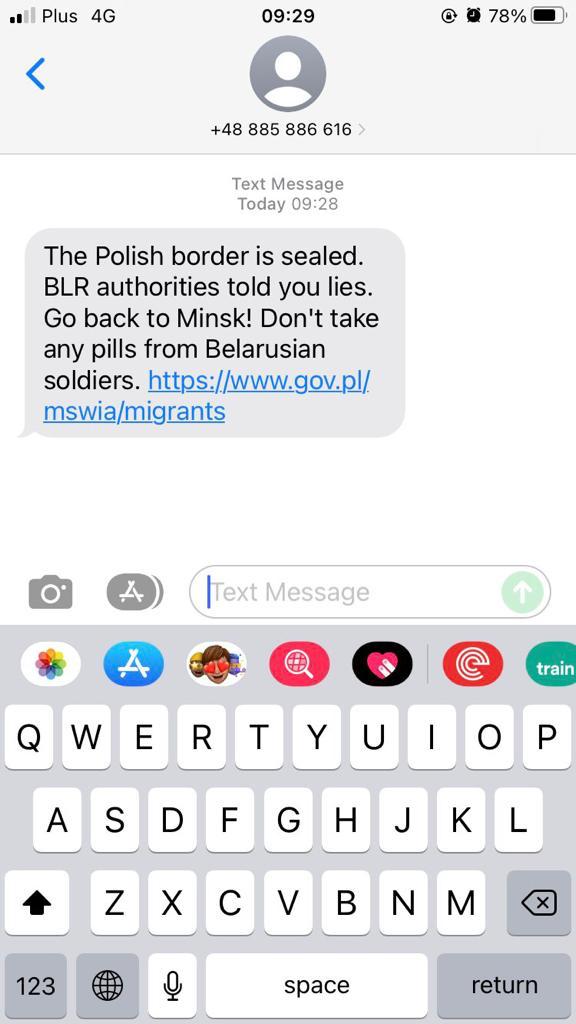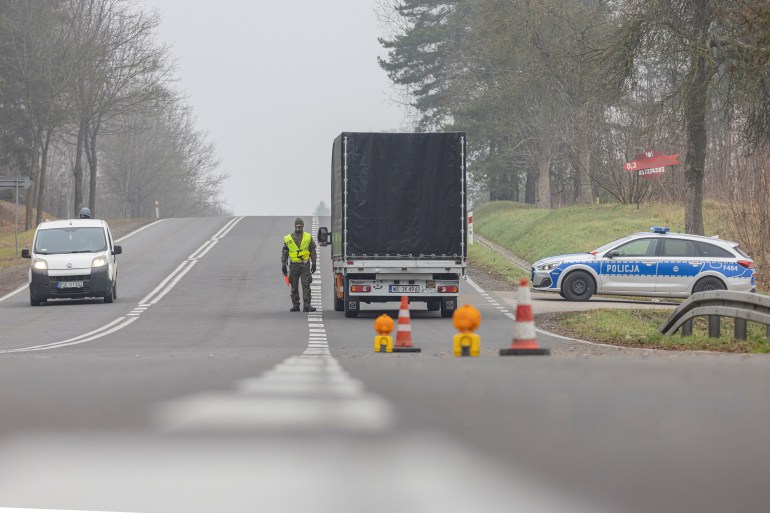Sokolka, Poland – As foreigners approach Poland’s border with Belarus, they automatically – as this reporter did – receive a simple and clear text message on their phones.
“The Polish border is sealed. BLR authorities told you lies. Go back to Minsk!” the SMS reads, referring to Belarus.
The text also includes a warning not to take any “pills” from Belarusian soldiers; there have been unverified reports that Belarusian border guards have given people tablets containing methadone in order to “survive” the dangerous crossing to the other side.
The message has been sent to the thousands of refugees and migrants who have tried to breach the frontier and enter Poland from Belarus in recent weeks, people that rights groups say are being used as tools in a months-long dispute between the West and Russia-allied Minsk.
The crisis deepened this week as hundreds more headed to the border in scenes some observers say are akin to those from the early stages of the 2015 European refugee crisis.

Poland has responded by strengthening its border to repel the growing numbers arriving from Belarus, with Warsaw and its allies accusing the administration of President Alexander Lukashenko – and Russian leader Vladimir Putin – of encouraging people to make the perilous journey towards Central Europe.
According to them, Minsk is acting in revenge, trying to destabilise Europe in return for Western sanctions on Belarus after last year’s disputed election that handed Lukashenko a sixth term – and the subsequent crackdown on dissent.
The escalating dispute has drawn in leaders from across the EU, NATO and the United States.
‘Difficult situation at the border’
In September, Poland introduced a state of emergency in the zone bordering Belarus.
Journalists and aid workers are prevented from accessing the area, which is 3km (about 2 miles) from Belarus and covers about 200 sleepy towns and villages. Only those who can prove they are local residents can pass one of the many roadblocks set up.
At a foggy stretch of road near Poland’s Kuznica border crossing with Belarus, a group of Polish border guards in fluorescent vests stop to check each car that passes in either direction.
“There is a difficult situation at the border,” says one guard. “You need to turn around.”
He shakes his head to underline the point – no one can proceed to the border area where thousands are gathered, hoping to seek asylum on European Union territory.
At another checkpoint further down the border, guards stop another car and search the boot before turning the driver back.
 Polish security forces have set up numerous roadblocks in the border region [Marko Djurica/Reuters]
Polish security forces have set up numerous roadblocks in the border region [Marko Djurica/Reuters]Temperatures are icy in the quiet border town of Sokolka.
Police cars and army trucks trundle along streets lined with Polish flags to celebrate Polish National Independence Day on November 11.
A 15-minute drive away, a humanitarian crisis is unfolding at the razor-wire fences of the Polish-Belarusian border as the crowds, including families with young children, are trapped in the geopolitical tug of war at the EU’s border.
This week, German Chancellor Angela Merkel urged Russia – Belarus’s main ally – to intervene while European Commission President Ursula von der Leyen raised the crisis in a meeting with US President Joe Biden in Washington, DC.
“We have to protect our democracies from this kind of cynical geopolitical power play,” she told reporters at the White House.
European Council President Charles Michel suggested on Wednesday for the first time that the EU could legally fund a border barrier, breaking with a longstanding tradition of refusals on the part of EU officials to provide any kind of funding for border walls.
Meanwhile, as political tensions simmer with no sign of resolution, refugees face the bleak prospect of another night out in the cold, risking hunger and hypothermia.
 Warsaw has deployed thousands of soldiers to Poland’s border with Belarus amid the ongoing crisis [File: Grzegorz Dabrowski/Agencja Gazeta/via Reuters]
Warsaw has deployed thousands of soldiers to Poland’s border with Belarus amid the ongoing crisis [File: Grzegorz Dabrowski/Agencja Gazeta/via Reuters]Crystal van Leuwen, a medical emergency manager for Poland/Belarus/Lithuania programme of Doctors Without Borders (Medecins Sans Frontieres, or MSF), which has teams on all sides of the border, told Al Jazeera that the group has been unable to access the restricted zone in Poland despite repeated requests.
Some people MSF has treated have reported extreme violence at the hands of EU border guards, said van Leuwen.
“People have described, in their own words, as being hit with the butt of a gun and kicked in the ribs,” she said.
“One person described that they had been electrocuted in the neck, with physical injuries which looked like what a Taser would leave. We have also treated people with severe dehydration and hypothermia, and significant mental illnesses including post-traumatic stress disorder, as well as people who have attempted suicide as a result of not knowing how to cope with the situation they have found themselves in.”
At the time of publishing, EU officials had not responded to Al Jazeera’s request for comment on these claims.

Van Leuwen said the current narrative surrounding the so-called weaponisation of people on the move distracted from serious medical issues on the ground.
“These are people, these are individuals and seeking asylum is not a crime. They have a right to due process and to be treated with dignity and respect.”
Van Leuwen also noted that contrary to reports suggesting that it was mainly young, single men at the border, their teams had met people of all ages, including families, pregnant women and children.
World - Latest - Google News
November 11, 2021 at 10:41PM
https://ift.tt/30bJJ3N
‘Go back to Minsk!’: Poland’s SMS warning to refugees amid crisis - Al Jazeera English
World - Latest - Google News
https://ift.tt/2SeTG7d
https://ift.tt/35oCZy1
Bagikan Berita Ini














0 Response to "‘Go back to Minsk!’: Poland’s SMS warning to refugees amid crisis - Al Jazeera English"
Post a Comment